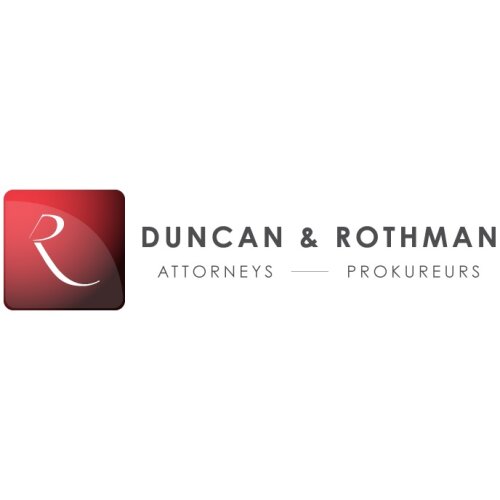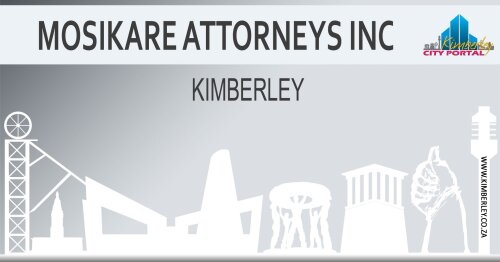Best Franchising Lawyers in Kimberley
Share your needs with us, get contacted by law firms.
Free. Takes 2 min.
List of the best lawyers in Kimberley, South Africa
About Franchising Law in Kimberley, South Africa
Franchising, a business model where the franchisor leases their brand's name, logo and trademark to the franchisee for business operations, is a thriving field in Kimberley, South Africa. Both local and international franchises have a significant presence here. Franchising law in Kimberley, operating within the broader framework of South African commercial law, stipulates the rights and obligations of both franchisors and franchisees. It covers areas such as contract negotiation, intellectual property, competition law, dispute resolution and compliance with corporate governance.
Why You May Need a Lawyer
From drafting and interpreting a franchise agreement to resolving disputes, there are numerous instances where seeking legal counsel is advisable. For example, a lawyer can provide valuable assistance when you're planning to purchase a franchise, ensuring that you understand all terms and conditions before investing. Similarly, if you're a franchisor looking to expand your business, legal advice can minimize potential risks. Also, in case of disputes between the franchisor and franchisee, a lawyer can guide you through litigation or arbitration processes.
Local Laws Overview
Franchising in Kimberley is governed by a combination of the broader South African laws such as the Consumer Protection Act (CPA), the Competition Act and the Franchise Association of South Africa's (FASA) Code of Ethics and Business Practices. The CPA obliges the franchisor to provide a prospective franchisee with a disclosure document and a copy of the proposed franchise agreement, at least 14 days before any contract is signed. This helps in providing transparency about costs, profits and risks involved. On the other hand, Competition law ensures there is a level playing field for all businesses and prevents dominant companies from engaging in practices that reduce competition.
Frequently Asked Questions
What should I look for in a franchise agreement?
Your franchise agreement should clearly outline the obligations and expectations of both parties, including fees, term of agreement, territory rights and terms regarding the sale or transfer of the franchise.
What happens if there is a dispute between the franchisor and franchisee?
If there's a dispute, the franchise contract should outline the resolution procedure. This could involve negotiation, mediation or litigation.
How can I protect my interests as a franchisee?
Before entering into a franchise agreement, review the contract with a lawyer, conduct due diligence and ensure you have a clear understanding of your obligations and rights.
Can I terminate my franchise agreement early?
Early termination of a franchise agreement depends on the terms of the contract and the circumstances leading to this decision. It's best to consult with a lawyer to discuss potential implications
What are my obligations as a franchisor?
As a franchisor, you are required to provide a disclosure document, a copy of the proposed franchise agreement and any other related agreement to the franchisee, among other obligations.
Additional Resources
The government's official website can provide information on local laws affecting franchising. Also, the Franchise Association of South Africa (FASA) provides resources and guides on franchising, and their code of ethics outlines the standard practices in the franchising sector.
Next Steps
If you need legal assistance in franchising, it's advisable to consult a lawyer who specializes in franchising or commercial law. Doing so could help you avoid common pitfalls, ensure you fulfill your legal obligations, and protect your rights whether you're a franchisor or franchisee.
Lawzana helps you find the best lawyers and law firms in Kimberley through a curated and pre-screened list of qualified legal professionals. Our platform offers rankings and detailed profiles of attorneys and law firms, allowing you to compare based on practice areas, including Franchising, experience, and client feedback.
Each profile includes a description of the firm's areas of practice, client reviews, team members and partners, year of establishment, spoken languages, office locations, contact information, social media presence, and any published articles or resources. Most firms on our platform speak English and are experienced in both local and international legal matters.
Get a quote from top-rated law firms in Kimberley, South Africa — quickly, securely, and without unnecessary hassle.
Disclaimer:
The information provided on this page is for general informational purposes only and does not constitute legal advice. While we strive to ensure the accuracy and relevance of the content, legal information may change over time, and interpretations of the law can vary. You should always consult with a qualified legal professional for advice specific to your situation.
We disclaim all liability for actions taken or not taken based on the content of this page. If you believe any information is incorrect or outdated, please contact us, and we will review and update it where appropriate.













